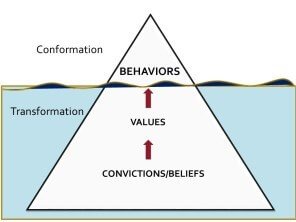
To read the full, original post “The Pattern of Discipleship,” click here.
“And do not be conformed (external) to this world, but be transformed (internal) by the renewing of your mind…”
— Romans 12:2
Conformation is the external (behavior) imitation while transformation is the inner (heart and mind) reformation.
We are told not to be conformed to the world, but neither should we be simply conformed to Christ in external behavior only. Our transformation must go below the water line of behavior to touch our heart and soul.

An iceberg illustrates the complexity of our outer and inner lives. The above (visible) part is held up and supported by the bigger invisible part. Jesus emphasized this important distinction in Luke 6:45:
“A good person produces good things from the treasury of a good heart, and an evil person produces evil things from the treasury of an evil heart. What you say flows from what is in your heart.”
The King James Version says, “Out of the abundance of the heart the mouth speaks.”
As men and women who are followers of Christ, our Imitation of Christ is to go beyond doing acts of kindness (valuable as it is), to actually becoming kind in heart. Imitation is the transformation of our inner values, convictions, and principles so that good behavior is not just action tacked on when we think about it, but rather what naturally comes from our newly transformed heart and mind.
This transformation process produces behavior that is so consistent as to become predictable. When I am asked to give a character reference for a potential employee, I know I am not being asked if I have just observed certain behaviors. They are asking if I have observed behavior so consistent as to become predictive of future actions. In other words, is the behavior more than an act? Is it genuinely coming from the treasury of a good heart?
Emulation may be a better word than imitation. Imitation can refer to a cheap copy, something poorly done, or a knockoff. Emulation, however, implies being genuine all the way through. In our technical world imitation refers to a computer running another computer’s “apps” (software programs), while emulation refers to running another computer’s inner operating system.
Image bearing is not only deep, it is comprehensive as Paul writes “…that you may prove what the will of God is” (Romans 12:2). Genuine emulation goes beyond obeying the biblical ethical code. It includes alignment to the whole will of God.
If I said I wanted to be like George Washington but all I knew about him was that he was the first president of the United States and the commander of the Continental Army, you would rightfully suspect I was not serious. If I were serious, I would read about what he said and did as well as what others said about him. I would want to study his speeches to learn what he valued. I would want to know his habits, practices, and mannerisms. Can we be serious about reflecting Christ when we know so little about Him? Are we satisfied with just knowing that He is our Savior and King?
Since Christ is to be the “first born among many brethren”; He is our elder brother. To emulate Him we need to comprehend His:
- Character
- Behavior
- Values
- Teaching
- Habits
- Mission
- Purposes
- Desires, etc.
Although the gospels give a limited account of the life of Christ, we have been given sufficient knowledge to understand His life Pattern. The Scripture also gives us the power to discern where we fall short in our inner character and motivations (2 Tim. 3:16-17; Hebrews 4:12). With this in mind, one practical way to expand our understanding of that Pattern is to read the gospels through the lens of one of the above concepts. For example, read Matthew looking for His values (stated and implied). Then read Mark looking for His mission or purposes, etc. Reading with a particular lens can open new insights into the One we are to emulate.
When Paul encountered Christ on the road to Damascus (Acts 22), he asked two questions:
- Who are you, Lord?
- What should I do?
The second question is an outgrowth of the first. We are called to follow the person of Christ not just a creed. As an apprentice, the more we understand and emulate WHO Christ is, the more we will be transformed and live a life in alignment with His will. Paul’s two questions should be at the heart of our apprenticeship today.
This excerpt is used with permission by Ron Bennett. To read the full article and to learn more about Ron Bennett, click here. You can also catch more from Ron on the topic of Growing in Spiritual Maturity on The Apprentice Approach Podcast, click here.
The Apprentice Approach is about helping every-day people master the art of disciplemaking and grew out of the fact that…. Many Christians struggle with making disciples, they feel busy, overwhelmed and not qualified. We understand this struggle which is why we created a Bible based framework so any believer can master the art of disciplemaking! One of our outcomes is seeing the folks we engage with walk away saying, “I can do that!”










